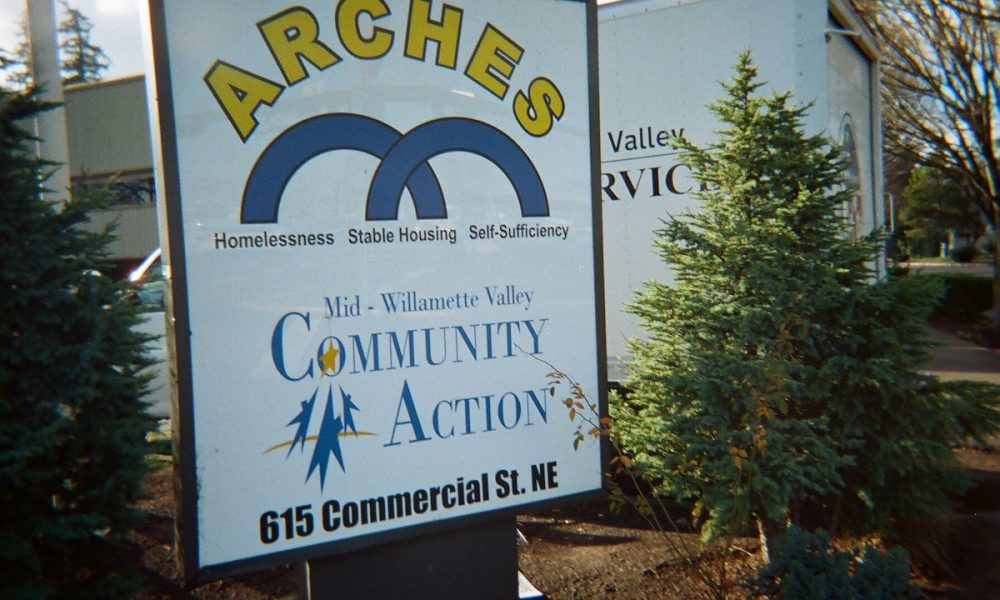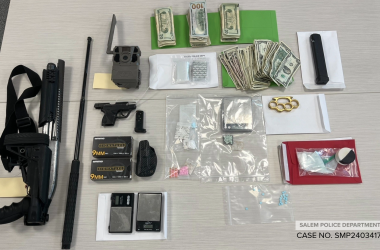 The sign at The Arches Project, where a sobering center and an expanded day center are proposed. With news Friday the federal government will go back to work, the proposals could be closer to reality. (Anthony McGuire/Special to Salem Reporter)
The sign at The Arches Project, where a sobering center and an expanded day center are proposed. With news Friday the federal government will go back to work, the proposals could be closer to reality. (Anthony McGuire/Special to Salem Reporter)
Count the proposed sobering center in downtown Salem among the beneficiaries of the federal government going back to work.
Construction of the center, which would take in drunk and intoxicated people that the police would otherwise jail or send to the emergency room, had stalled in part by furloughs at the U.S. Department of Housing and Urban Development, according to city officials.
After President Donald Trump announced Friday he reached a deal with Congressional Democrats to start the government again for at least three weeks, construction of the center could be close at hand.
The center is half of a $1.4 million expansion at The ARCHES Project, at 615 Commercial St. N.E., and officials were awaiting a $300,000 federal grant to be finalized before starting construction.
“We could start construction sometime mid-February,” said Jimmy Jones, executive director of the Mid-Willamette Valley Community Action Agency, which oversees ARCHES. But he cautioned the center’s future is unclear after the Feb. 15 deadline for the latest federal government deal passes.
The grant delay was just the latest in a string of hiccups for the ARCHES expansion, which would also expand its day center to add showers, laundry and more bathrooms.
According to Jones, construction was slated to start October last year, but workers discovered the property held significance for the Confederated Tribes of Grand Ronde, prompting changes to the plan.
Jones said he then hoped to see construction start Jan. 1, but the federal government closed Dec. 22 amid disputes in Washington over funding a wall across the United States’ southern border.
City Urban Development Director Kristin Retherford said Thursday, before the President’s announcement, that contacts with the federal government then started to drag.
“All questions, responses, reviews, etc. are being handled by the skeleton crew of higher level managers,” Retherford told Salem Reporter in an email. “It hasn’t brought the process to a dead stop, but has certainly created a slowdown.”
The city is helping fund the sobering center’s construction with approximately $300,000 dollars from urban renewal.
After the President’s announcement, Retherford said the government reopening did not guarantee construction can start. She expected there will be a backlog of work for federal staffers even ahead of the new deadline.
“I don’t know if they’ll be able to get through everyone on their end if there’s a queue,” she said Friday. “I think it all depends on how long they’re back at work.”
The expanded day center would address many recommendations made last summer by the city’s Downtown Homeless Task Force, while a sobering center would treat people with substance abuse problems.
A shell is already built for the expanded day center and the sobering center. Jones said he believed construction could be relatively quick.
“We’re still looking at about three months out from the moment we’d be under construction to when it could open,” he said. “Three months might be ambitious.”
Still, there are other factors to consider after construction. The expected costs to run the center have grown to $954,722 in the first year and $983,364 in the second year, according to documents obtained by Salem Reporter. The city, Marion County and Salem Health have so far pledged $450,000 a year.
The site is across the street from where the city of Salem last week evicted a homeless camp of at least 15 people after the city said it had received increased reports of crime and vermin.
On Wednesday night at a work session for Salem City Council, Salem Police Chief Jerry Moore told councilors getting the sobering center would be a first step to getting people in recovery and another “tool” for police.
“It’s been identified as something we feel could help people on their first step to recovery and maybe just as important it would give us a tool to remove people from situations where they haven’t necessarily committed a crime but they are unable to care for themselves, and they’re creating a situation where a neighborhood or a business district is concerned about their behavior,” he said.
Have a tip? Contact reporter Troy Brynelson at 503-575-9930, [email protected] or @TroyWB.









